[Preface] [Introduction] [Beginnings] [Antireformation] [Breakdown] [Dreams]
A Genealogy of a Czech millers´ family Kysilka
Part Six
We finished our previous story in a tiny village of Vranice on the border of the Litomysl´s and Nove Hrady´s estates in 1830s. The younger son of the miller Vaclav Kysilka of Vranice was Jan Kysilka, born on December 28, 1812. He married Anna Patava, a daughter of Vaclav Patava of Jarosov No. 74.
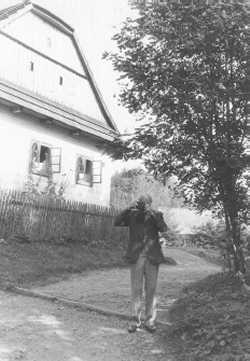
A cottage on the end of Jarosov. It may have been the
place,
where my great-grandfather Vincenc Kysilka (*1836) lived with parents. Photo 1988.
Their wedding took place after the harvest 1836 (on 30th August). Two and half months before their wedding day, the groom and the bride concluded the Marriage Contract that starts with following paragraphs:
It has been unconstrained agreed this day and year, that between Jan Kisilka, the proper son of Waclaw Kisilka of the village of Vranice, that to the community of Jarossow and to the estate of the town of Lythomissl belonging , with the father´s will and consent, as the groom on the one side, - and then Anna, the proper daughter of Waclaw Patiawa of the village of Jarossow, with whose consent, on the other side, the following Wedding Contract had been concluded as the irrevocable conjunction with the exception of the spiritual union.
1st: This young forthcoming couple had promised the love and the matrimonial
fidelity to each other until the death parts them .....
2nd: As the dowry, the bride´s father Waclaw Patiawa assigns to the common property of
Jan Kysilka and his forthcoming spouse Anna Patiawa, his own (under the No. Cons. 74)
cottage in the village of Jarosov as per the Land register book of Jarosow ab anno 1766,
fol.409 incorporated, with the adjacent garden and with all what belongs to this cottage,
either being nailed to or by the lime whitewashed, for a Total main Sum of 100 fl. Conv.
M., i.e. One Hundred Guldens in Silver... etc....Waclaw Patiawa reserves for him and his
wife Weronika the dwelling in the cottage until the death of both as follows: a. To share
a common room with the farmers... b. The share of 1/3 of the Garden yield, as well as from
the grass and the fruit, c. One chamber, a place in the cellar for the storage of
"earth-apples" and cabbage, then a cow-shed...
3rd: The groom´s father Waclaw Kisilko confirms that he will pay in cash 400 fl. Conv.
M., i.e Four Hundred Guldens in silver to the couple after their spiritual conjunction. He
assigns in natura 1 cow, 2 duvets, a chest and an armoire for cloths as the counterdowry.
4th: (the provisions in the case of the death of either party)
All, this marriage contract and contract of inheritance, has been signed true and artless by both parties and by three independant witnesses...
In Jarosow on the 13th of June 1836
Jan Kisilka, the groom +++Anna Patiawowa, the bride, Waclaw Kisilka, father
+++Waclaw Patiawa, father
Joh. Erban, Jan Konrad Hradeczky, Witness, Kaspar Wilim, witness.
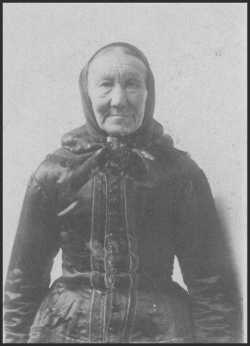
Anna Kysilka (*1848, + 1923), daughter of Jan Kysilka
and Anna Paťava,
later married Lnenicka in Jarosov. Vincenc´s Kysilka sister..
This was an example of the old Wedding contract. Would you please note, that neither the groom, nor the bride are called the honest lad and girl, as it was usual in other contracts of that time ? It was because in the previous year, on November 11, 1835, Anna Patava gave birth to her unlegitimate daughter Katerina. Jan in a short time admitted his paternity and was probably forced to the marriage by both parents. It has left two and half months from the signing the contract to the wedding day, which was not usual. Normally, the marriage took place in the same month. The little Katerina died before the wedding probably. This could be the reason for the delay as well. And a new baby was on the way already...
Christmas Day A. D. 1836 was a very festive one. A boy in the family Kysilka was born, whose name was Vincenc. His later son, Vincenc too, was my grandfather and he wrote during the WWII. his memories, that begin by the birth of his father. These memories will serve us as the main source for the depicting of the future fates of our kin.
All following children, except of Anna, born in 1848, died in childhood. Anna later married Vaclav Lnenicka, a taylor in Jarosov and died in 1923. Her descendents have been still living there.
Shortly after Anna´s birth father Jan died and his widdow Anna keeps the house No. 74 in Jarosov until 1849, when she sells it to Josef Ludvicek of Osek..
The young Vincenc must take care for himself. He made his apprentice with the uncle Vaclav in Vranice´s mill."Then my father worked at the Haberky near Nove Hrady. It used to be a mill there, not only a saw. He did not stay there for a long time. Thenafter he started to work as a mill-hand in Dolany, on the next-but one mill called Vapenka on the Novohradka river." It was sometimes by the end of 1853. The proprietor of the mill was a miller called Dominik Vilimek, who inherited the mill after his father Frantisek Vilimek.
Frantisek Vilimek came to this mill in the year 1815. Until that time he was a bartley-dealer in the town of Vysoke Myto. He hailed of a famous miller´s family in Castolovice No. 2. His nephew Josef Richard Vilimek (*1835) was the founder of the Prague publishing house Vilimek´s Publishers and a deputy of the Reichstag in Vienna. Frantisek Vilimek married Maria Magdalena Harnach, a daughter of the town´s forrest ranger Vaclav Harnach. A short history of the Harnach family, who were of noble descend, is described here.
Dominik Vilímek (1814 - 26. 1. 1854) was all his life a miller on the Vapenka mill in Dolany. In 1839 he married a seventeen-years-old Anna Suricek, a daughter of barley-dealer and miller Martin Suricek of neighboring village Roudna. A year after their wedding a daughter Marie was born. She became later the spouse of Vincenc Kysilka.
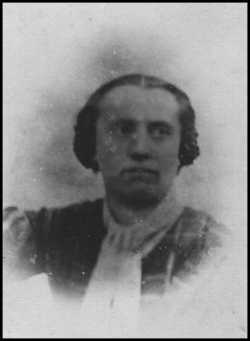
Marie Vilimek (1840 - 1891), This photo was taken
during
her employment in Litomysl around 1858 - 1864
"The grandfather Vilimek, who liked to have a drink from time to time, was still alive, by the time Vincenc came to the mill of Vapenka. He used to fetched Vincenc for the hard stuff to spite her wife. The grandfather Vilimek was without an arm, I think the right one. He lost it when peeling the grain of barley on the "hollander. Several months later he died of the miller´s disease, the tuberculosis.
Vincenc continued to stay in the mill in employ. The oldest miller daughter Marie or Marianna captivated him. Neither he was indifferent towards her. "They used to eat at one table and she was once staring at him so much, that a spoon slipped out of her hands." The mother Vilimek was not favourable to their love and she must have felt relieved, when Vincenc was drafted to the Army (by the end of 1857) and went to the war with the newly creating Italy.
Vincenc and marie were in correspondance all that time. "... a lot of letters was in the loft. And all the time he was in the army, many various suitors used to com to the mill. But she refused all of them and she preferred to be in employ in Litomysl, though she was oft mal-treated there."
The length of the military service was seven long years.Vincenc was in Terst, Venice, Padua and Milano. Originally he joined up the artillery, but in fact all the war time he served as a batman of the "hauptmann" Cermak and never fell into a battle. On the other side he never case home for holiday. He learnt to speak Italian and a little German. He returned home being twenty-seven in 1864. For his services he was decorated by a medal of merit and he had not even parted with it after the death.
Using our grandfather´s memories we may characterize his father. He was apparently a sightly boy. Lightminded, gullible and unsteady. On the other side he was fierce or forceful, even violent, he used to drink a lot under the circumstances. He was a good, bonny companion, he loved fun, girls and singing.("Whenever possible, he found the way how to get at a young girl and to touch her breast."). He made his wife hard times, but "never laid hands on her."
Despite of mother´s will, he took Marie away of the Vapenka mill and they started a family life in Jarosov, but not married yet. "They had a small barley - store and a newsstand in a small cottage on the way from Vranice to Jarosov." In 1865 a daughter, named Marie, was born. They planned to marry, but a new war between Austria and Prussia postponed it in 1866.
His regiment drew again to Italy and Vincenc stayed in Laibach all the time. When he returned home, they bought a new cottage, dealt with peeled barley, tobbacco, and run a tap-room. They became reconciled with the mother Vilimek and Marie received her share on the Vapenka mill. Vincenc decided to convert to the catholic faith, in order to remove last objections of the mother-in-law. The wedding took place in the Mladocov´s church on August 20, 1867 and Vincenc thus legitimized the birth of their daughter Marie.
All things went all right. Marie kept the household in order and Vincenc have rebuilt and repaired their house, but he was still missing a mill. He managed to hire a mill with a saw in Budislav, called "Trisnik", for three years. They were getting on well, the mill provided them a lot of grinding.
The second daughter Anna (1869) and the only boy, Vincenc, my grandfather (1872) , were born in this mill, though the records in the birth register state the cottage in Jarosov as the birthplace. In 1872 the lease contract was over. But the mill was for sale and the proprietor offered the mill to Vincenc. "My father liked it, therefore he tried to find a buyer for their cottage in Jarosov and he managed." But he made a mistake and informed his brother-in-law, Frantisek Vilimek, who was a miller too, about his intends. Frantisek Vilimek decided to overrun Vincenc and to buy the mill for himself. "The uncle Franc was passing our cottage, where my father organized a party with friends to celebrate a good deal." He had no idea that moment, that he was having no job, no mill, no cottage anymore. They had to buy a new house in Jarosov, not too far from the old one.
The third daughter was Frantiska, born in 1874, and four years later the last Antonie. "I can remember Antonie´s baptism, even that she was a very nice and clever child. She was able to walk and speak very early.... When she was three years old, several children in neighborhood died of diptheria. The little Tony started to weep and was irritable. Nobody thought she could have diphteria too. Mother supposed she was disobedient only and was given something to remember. But Tony died within three days and mum reproached herself for having her beaten right on the death´s door."
In about 1874 Vincenc, who could not find a better job, became the town´s woodranger in the Budislav´s hunting ground. His duties were to care for the order and legality in the forrest. The service of the town´s ranger was an unrewarding, but also unpopular, risky and a dangerous one. The proof for it was a report of his superior forrester Josef Klumpar to the esteemed Town Council of Litomysl:
"On January 2nd, 1877 at 11 p. m. the ranger Vincenc Kysilka of Jarosov during his night shift noticed three men having cut down a fresh pine-tree, 14 meters long and 21 centimeters in diameter. The pine was sawn into three pieces and each of the thefts was carrying one of them to take them home. Kysilka hurried up and cought one of the theft, recognizing him. It was Franc Faimon, a cottager of Jarosov No. 94. When the ranger hold the same around his neck, the other came near to help Faimon and wanted to hit Kysilka by a stick ...The next day we came together with Kysilka to Faimon´s house and Franc Faimon... scolded us to as if we were thefts, bastards and lots and wanted to throw the ranger Kysilka down of the loft. Faimon´s son was crying: I am going to kill... Kysilka down here..." Another time Kysilka cought Josef and Jan Stritesky of Budislav in the act. "... the older Stritesky cought the ranger round the neck with intention to choke him."
Really, his service was not easy. Too much troubles, probably enemies and a low remuneration. His reward was 36 Guldens a year at the beginning. Later it was increased to 50 Guldens. In summer 1877, Vincenc and his colleage Vaclav Vomocil requested the Town Council of Litomysl for another increase of the salary. They complained about money, since they have to buy one pair of shoes for 35 fr. every year and the rest of 15 fr.is unsufficient for living. They pointed out, how many enemies they do have in their villages and how they serve faithfully and assiduously .
Their request was taken up by the Council in September 1877 and the increase of the remuneration was postponed for the next year. The rengers probably received the increase, since in 1882, there is a mention of a salary of 75 Guldens and 3 fathoms of wood in natura.
Their highest superior was the town´s chief forrester Jan Seeman, whose reward was 500 Guldens per year that time.Jan Seeman (1813 - 1903) was a famous Litomysl´s figure of the second half of the 19th century. He was a tall man, the face of sharp features with the eagle-like nose, and a long white fullbeard, that reached to his breast. He once came to Jarosov, to the Kysilkas. It was before Christmas Eve, it was snowing, and only the children, Marie, Anna and Vincenc were at home. They got scared, thinking the old man with the long sparkling beard by snowflakes being Saint Niclaus. They knelt down and prayed. A famous Czech writer Alois Jirasek, who lived in Litomysl that time, described this story in his Memories.
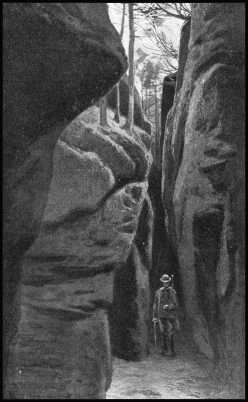 |
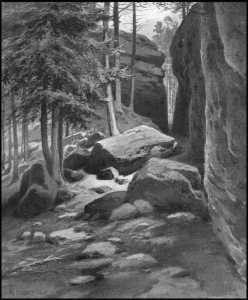 |
Motivy z Budislavských skal od K. Liebschera. Z knihy J. Otto Čechy - Východní Čechy
Vincenc was unhappy all the time, he served in forests, mainly because he had lost the mill in Budislav. He drank a lot and neglected his duties. In 1882 Vincenc decided to leave the "green" service, since there was a chance to lease the Kusy´s mill in Vranice.
The Kusy´s mill was the lower mill in Vranice, near Roudna already, whereas the upper mill was the one,that had belonged originally to Vaclav Kysilka and later to a miller, called Konicek. There was an antagony between these two millers. "My father was very popular, he was cheap, and so, all farmers used to go to grind their crop in our mill, instead in Konicek´s". So he saw to it, that father Vincenc received the notice from the mill. "Dad accepted the compensation of 60 Guldens. The lease contract was concluded for a period of six years and he stayed there only for about two years."
In this fatal year 1872, the daughter Frantiska died in age of 8 years, possibly of scarlet or typhoid fever. "He cried he had a headache, then all body burnt, and she turned deaf." She died in several weeks.
All Vincenc´s life until that time were only dreams, desire and vain hopes. But he did not give it up. Despite of the fate, he started to seek an apropriate mill again. In Nove Hrady, Rvasice, Pusta Rybna, even in Jimramov. Nothing...
His brother-in-law, Antonin Vilimek of Prosec, recommended him to buy an empty barley-store in Svratka, a small town some 20 kilometers from Jarosov.
Litomyšl v době, kdy Vincenc Kysilka st. býval městským hajným Z knihy J. Otto Východní Čechy